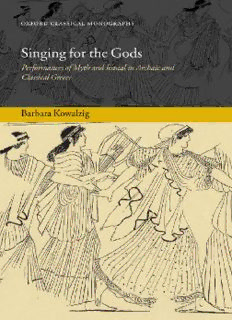
Singing for the Gods: Performances of Myth and Ritual in Archaic and Classical Greece (Oxford Classical Monographs) PDF
Preview Singing for the Gods: Performances of Myth and Ritual in Archaic and Classical Greece (Oxford Classical Monographs)
OXFORD CLASSICAL MONOGRAPHS Published under the supervision of a Committee of the Faculty of Classics in the University of Oxford The aim of the Oxford Classical Monograph series (which replaces the Oxford Classical and Philosophical Monographs) is to publish books based on the best theses on Greek and Latin literature, ancient history, and ancient philosophy examined by the Faculty Board of Classics. Singing for the Gods Performances of Myth and Ritual in Archaic and Classical Greece BARBARA KOWALZIG 1 3 Great Clarendon Street, Oxford ox2 6dp Oxford University Press is a department of the University of Oxford. It furthers the University’s objective of excellence in research, scholarship, and education by publishing worldwide in Oxford New York Auckland Cape Town Dar es Salaam Hong Kong Karachi Kuala Lumpur Madrid Melbourne Mexico City Nairobi New Delhi Shanghai Taipei Toronto With offices in Argentina Austria Brazil Chile Czech Republic France Greece Guatemala Hungary Italy Japan Poland Portugal Singapore South Korea Switzerland Thailand Turkey Ukraine Vietnam Oxford is a registered trade mark of Oxford University Press in the UK and in certain other countries Published in the United States by Oxford University Press Inc., New York © Barbara Kowalzig 2007 The moral rights of the author have been asserted Database right Oxford University Press (maker) First published 2007 All rights reserved. No part of this publication may be reproduced, stored in a retrieval system, or transmitted, in any form or by any means, without the prior permission in writing of Oxford University Press, or as expressly permitted by law, or under terms agreed with the appropriate reprographics rights organization. Enquiries concerning reproduction outside the scope of the above should be sent to the Rights Department, Oxford University Press, at the address above You must not circulate this book in any other binding or cover and you must impose this same condition on any acquirer British Library Cataloguing in Publication Data Data available Library of Congress Cataloging in Publication Data Data available Typeset by RefineCatch Limited, Bungay, Suffolk Printed in Great Britain on acid-free paper by Biddles Ltd., King’s Lynn ISBN 978–0–19–921996–4 1 3 5 7 9 10 8 6 4 2 To my family This page intentionally left blank α(cid:2)τ(cid:4)κα γα˜ πα˜σα χορε(cid:13)σει This page intentionally left blank Acknowledgements To set the Greek world singing and dancing is, like the khoros itself, a communal activity. And like the Greek chorus, it forges bonds going beyond the actual practice. I have had many fellow-dancers in the production of this book. The sensitivity, wisdom, and rigour of Robert Parker have accompanied it at every stage, and I owe more to him, and his humanity, than to anyone else. Simon Hornblower oversaw the process of turning the thesis into the much larger book, and has generously and committedly brought his exactitude, breadth of know- ledge, and intellectual open-mindedness to my ideas. Chris Pelling heroically read the near-completed manuscript and has throughout been a wonderful and stimulating colleague. Oliver Taplin’s good intuitions and optimism have encouraged this book from the very beginning, and he imperceptibly drew me into performance and theatre studies. My closest synkhoreut for many years now has been Peter Wilson, whose expertise, imagination, and boldness have unswervingly supported this project; another athlon in choral matters goes to Ian Rutherford, whose range of knowledge and friendship has been a great source of inspiration. I have been much stimulated by lively discussion with Leslie Kurke and Giambattista D’Alessio; they both allowed me to see their brilliant articles long before their publication. Emily Mackil shares my enthusiasm for tramping around the Greek landscape in search of its social topography, ancient and modern, and has been a careful and acute reader of my work. Ewen Bowie and Pat Easterling have examined the thesis and have shown continued interest in this project. Nicholas Purcell was enthusiastic for my adventures in the Mediterranean. Katherine Clarke has been an invaluable friend personally and academically. I further thank Lucia Athanassaki, Lisa Bendall, Bruno Currie, John Davis, Gunnel Ekroth, David Fearn, Catherine Holmes, Nikolaos Papazarkadas, Tim Rood, and Scott Scullion. I have learned a lot about the English language from my close friends—especially Erika Milburn and Philomen Probert—who with admirable patience and reliability kept smoothing my sentences. Annelies Cazemier and Theodora Jim kindly assisted me with the proof-reading, and Nigel James’s technical expertise has been essential in the map production. I am much indebted to the members of the Centre Louis Gernet in Paris, where the book took its final shape in a highly inspiring atmosphere and in perfect working conditions. François Lissarrague made this stay possible in the first place, and has been indefatigably generous and inspirational. Claude Calame, Pauline Schmitt, and François de Polignac offered me the chance to present my work in their seminars: this set off a host of new ideas at that late stage. I would like to thank particularly Jean-Claude Schmitt for instructing me on the anthropology of music and ritual, as well as Rosine Adda, Vincent Azoulay, Renée Piettre, Gabriella Pironti and Agnès Tapin. I finally owe thanks to Heather Watson and
Description: